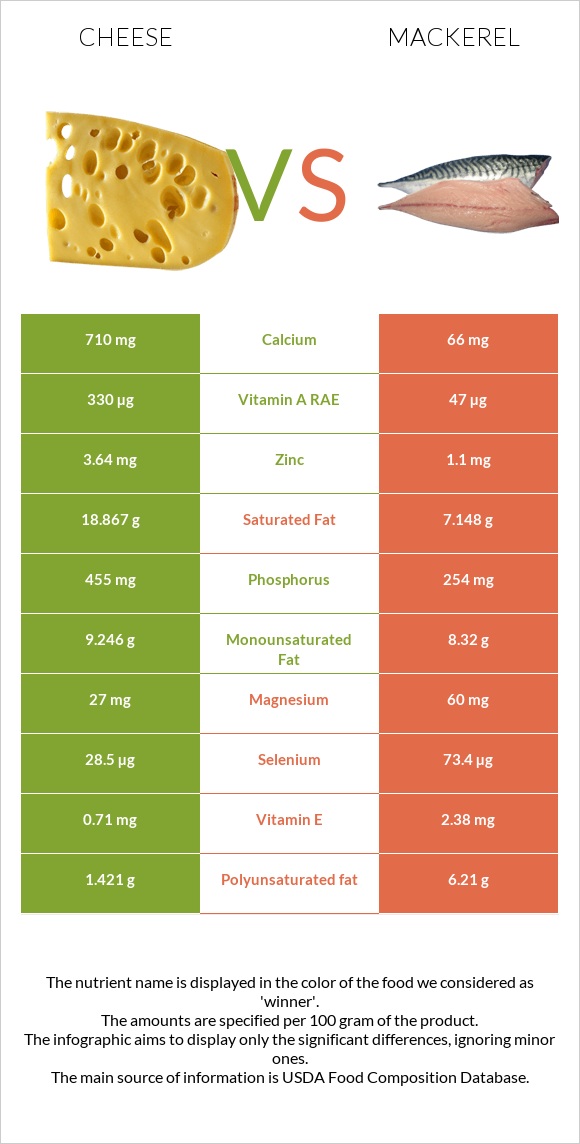Cheese vs. Mackerel — In-Depth Nutrition Comparison
Compare
How are cheese and mackerel different?
- Cheese is higher in calcium, phosphorus, zinc, and vitamin A; however, mackerel is richer in vitamin B12, vitamin D, selenium, and vitamin B6.
- Daily need coverage for vitamin B12 for mackerel is 454% higher.
- Cheese contains 11 times more calcium than mackerel. While cheese contains 710mg of calcium, mackerel contains only 66mg.
- Mackerel has less saturated fat.
Cheese, cheddar and Fish, mackerel, salted are the varieties used in this article.
Infographic

Infographic link
Mineral Comparison
Mineral comparison score is based on the number of minerals by which one or the other food is richer. The "coverage" charts below show how much of the daily needs can be covered by 300 grams of the food.
| Contains more CalciumCalcium | +975.8% |
| Contains more ZincZinc | +230.9% |
| Contains more PhosphorusPhosphorus | +79.1% |
| Contains less SodiumSodium | -85.3% |
| Contains more ManganeseManganese | +∞% |
| Contains more MagnesiumMagnesium | +122.2% |
| Contains more PotassiumPotassium | +584.2% |
| Contains more IronIron | +900% |
| Contains more CopperCopper | +233.3% |
| Contains more SeleniumSelenium | +157.5% |
Vitamin Comparison
Vitamin comparison score is based on the number of vitamins by which one or the other food is richer. The "coverage" charts below show how much of the daily needs can be covered by 300 grams of the food.
| Contains more Vitamin AVitamin A | +602.1% |
| Contains more Vitamin B1Vitamin B1 | +45% |
| Contains more Vitamin B2Vitamin B2 | +125.3% |
| Contains more Vitamin B5Vitamin B5 | +∞% |
| Contains more FolateFolate | +80% |
| Contains more Vitamin EVitamin E | +235.2% |
| Contains more Vitamin DVitamin D | +4100% |
| Contains more Vitamin B3Vitamin B3 | +5493.2% |
| Contains more Vitamin B6Vitamin B6 | +521.2% |
| Contains more Vitamin B12Vitamin B12 | +990.9% |
| Contains more Vitamin KVitamin K | +225% |
All nutrients comparison - raw data values
| Nutrient |  |
 |
DV% diff. |
| Vitamin B12 | 1.1µg | 12µg | 454% |
| Sodium | 653mg | 4450mg | 165% |
| Vitamin D | 24 IU | 1006 IU | 123% |
| Vitamin D | 0.6µg | 25.2µg | 123% |
| Selenium | 28.5µg | 73.4µg | 82% |
| Calcium | 710mg | 66mg | 64% |
| Saturated fat | 18.867g | 7.148g | 53% |
| Polyunsaturated fat | 1.421g | 6.21g | 32% |
| Vitamin A | 330µg | 47µg | 31% |
| Phosphorus | 455mg | 254mg | 29% |
| Vitamin B6 | 0.066mg | 0.41mg | 26% |
| Zinc | 3.64mg | 1.1mg | 23% |
| Vitamin B3 | 0.059mg | 3.3mg | 20% |
| Vitamin B2 | 0.428mg | 0.19mg | 18% |
| Iron | 0.14mg | 1.4mg | 16% |
| Choline | 16.5mg | 101.6mg | 15% |
| Fats | 33.31g | 25.1g | 13% |
| Potassium | 76mg | 520mg | 13% |
| Vitamin E | 0.71mg | 2.38mg | 11% |
| Protein | 22.87g | 18.5g | 9% |
| Magnesium | 27mg | 60mg | 8% |
| Copper | 0.03mg | 0.1mg | 8% |
| Vitamin B5 | 0.41mg | 8% | |
| Calories | 404kcal | 305kcal | 5% |
| Vitamin K | 2.4µg | 7.8µg | 5% |
| Folate | 27µg | 15µg | 3% |
| Monounsaturated fat | 9.246g | 8.32g | 2% |
| Carbs | 3.09g | 0g | 1% |
| Cholesterol | 99mg | 95mg | 1% |
| Manganese | 0.027mg | 1% | |
| Vitamin B1 | 0.029mg | 0.02mg | 1% |
| Protein per 100 calories | 5.660891089108911g | 6.065573770491803g | N/A |
| Calories per 10 g protein | 176.65063401836466kcal | 164.86486486486487kcal | N/A |
| Net carbs | 3.09g | 0g | N/A |
| Sugar | 0.48g | 0g | N/A |
| Trans fat | 0.917g | N/A | |
| Tryptophan | 0.547mg | 0% | |
| Threonine | 1.044mg | 0% | |
| Isoleucine | 1.206mg | 0% | |
| Leucine | 1.939mg | 0% | |
| Lysine | 1.025mg | 0% | |
| Methionine | 0.547mg | 0% | |
| Phenylalanine | 1.074mg | 0% | |
| Valine | 1.404mg | 0% | |
| Histidine | 0.547mg | 0% | |
| Omega-3 - EPA | 0.01g | 1.619g | N/A |
| Omega-3 - DHA | 0.001g | 2.965g | N/A |
| Omega-3 - DPA | 0.017g | 0.391g | N/A |
| Omega-6 - Eicosadienoic acid | 0.007g | N/A |
Macronutrient Comparison
Macronutrient breakdown side-by-side comparison
| Contains more ProteinProtein | +23.6% |
| Contains more FatsFats | +32.7% |
| Contains more CarbsCarbs | +∞% |
| Contains more WaterWater | +16.2% |
| Contains more OtherOther | +261.2% |
Fat Type Comparison
Fat type breakdown side-by-side comparison
| Contains less Sat. FatSaturated fat | -62.1% |
| Contains more Poly. FatPolyunsaturated fat | +337% |
~equal in
Monounsaturated fat
~8.32g